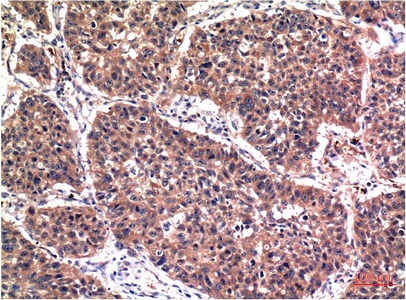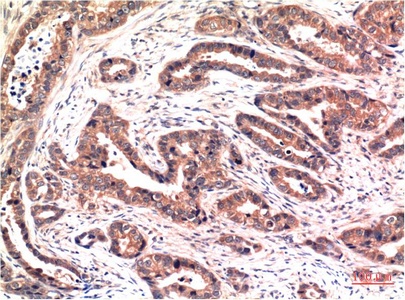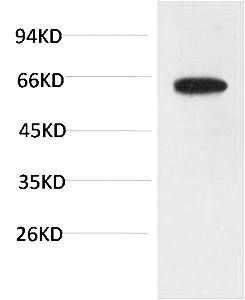| Product name | Phospho-Akt (S473) Mouse Monoclonal Antibody (6F8) |
| Immunogen | Synthetic Peptide of Phospho-Akt (S473) at AA range of 410-490 |
| Host | Mouse |
| Reactivity | Human |
| Applications | IHC-P, WB |
| Applications notes | Optimal working dilutions should be determined experimentally by the investigator. Suggested starting dilutions are as follows: WB (1:1000-1:2000), IHC-P (1:100-1:200). |
| Clonality | Monoclonal |
| Preparation method | The antibody was affinity-purified from mouse ascites by affinity-chromatography using specific immunogen |
| Alternative | AKT1 |
| Formulation | Liquid solution |
| Concentration | 1 mg/ml |
| Storage buffer | PBS containing 50% Glycerol, 0.5% BSA and 0.02% Sodium Azide. |
| Storage instructions | Stable for one year at -20°C from date of shipment. For maximum recovery of product, centrifuge the original vial after thawing and prior to removing the cap. Aliquot to avoid repeated freezing and thawing. |
| Shipping | Gel pack with blue ice. |
| Precautions | The product listed herein is for research use only and is not intended for use in human or clinical diagnosis. Suggested applications of our products are not recommendations to use our products in violation of any patent or as a license. We cannot be responsible for patent infringements or other violations that may occur with the use of this product. |
| Background | The serine-threonine protein kinase encoded by the AKT1 (AKT serine/threonine kinase 1) gene is catalytically inactive in serum-starved primary and immortalized fibroblasts. AKT1 and the related AKT2 are activated by platelet-derived growth factor. The activation is rapid and specific, and it is abrogated by mutations in the pleckstrin homology domain of AKT1. It was shown that the activation occurs through phosphatidylinositol 3-kinase. In the developing nervous system AKT is a critical mediator of growth factor-induced neuronal survival. Survival factors can suppress apoptosis in a transcription-independent manner by activating the serine/threonine kinase AKT1, which then phosphorylates and inactivates components of the apoptotic machinery. Mutations in AKT1 have been associated with the Proteus syndrome. Multiple alternatively spliced transcript variants have been found for AKT1. |
| Gene ID | 207 |
| Alternative | AKT1 |
| Others | Phospho-Akt (S473) protein detects endogenous levels of AKT1. |
| Accession | P31749 |
| Observed Band(KD) | 60 |

Fig.1. Immunohistochemical analysis of paraffin-embedded Human Lung Carcinoma Tissue using Phospho-Akt Ser473 Mouse mAb diluted at 1:200.

Fig.2. Immunohistochemical analysis of paraffin-embedded Human Breast Carcinoma Tissue using Phospho-Akt Ser473 Mouse mAb diluted at 1:200.

Fig.3. Western blot analysis of PC3 Cell Lysate using Phospho-Akt Ser473 Mouse mAb diluted at 1:1000.
You must be logged in to post a review.
1.The species of antibody reactivity should be the sample species that can be matched normally after Abbkine R&D experts have passed strict scientific verification. If your sample is not within the range of reactivity, in order to improve the efficiency and results of your experiment, it is not suggested to try other species. Otherwise, it may lead to sample mismatch and affect the effect of your experiment.
2.Please aliquot the antibody received as soon as possible and store it at -20℃, avoid repeated freezing and thawing, and use it within one year.
Welcome any form of communications, and better service will be provided here.
Tell: +1-404-854-0155
Email: service@abbkine.com
Support Email: support@abbkine.com
Address: 3052 Stroop Hill Road, Apt 203, Atlanta 30303, Georgia, United States of America




Reviews
There are no reviews yet.